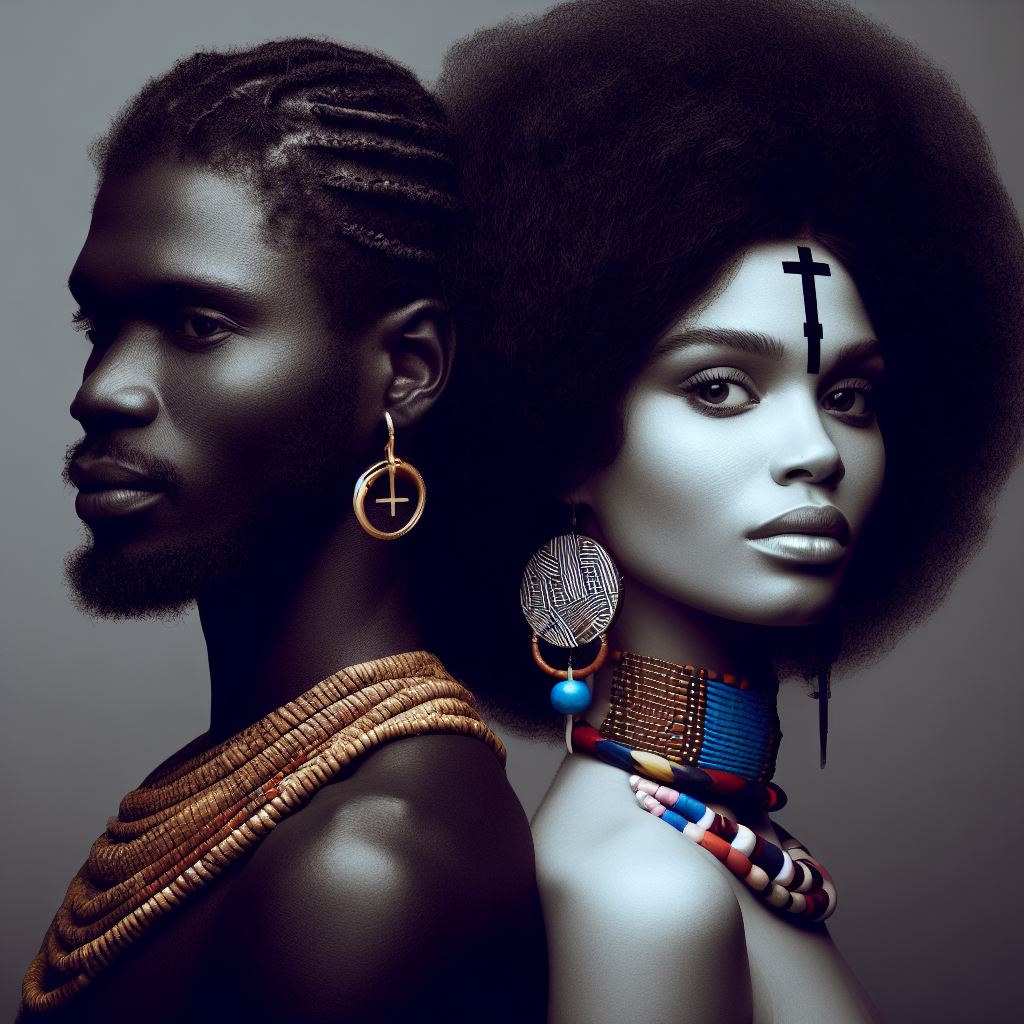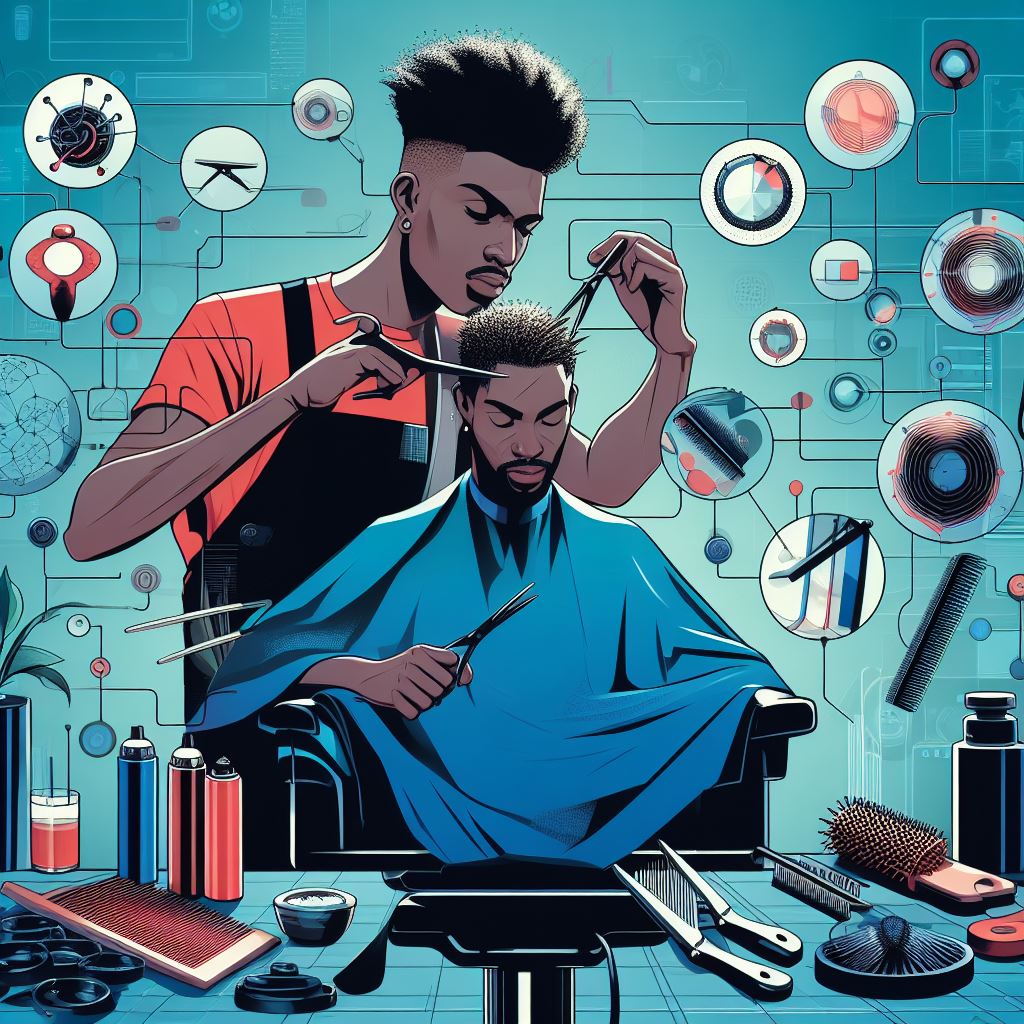Introduction
Hair styling plays a significant role in Nigerian culture, reflecting cultural differences based on gender.
Hair holds immense cultural significance in Nigeria, representing personal identity and cultural expression.
Different ethnic groups showcase diverse styles, reflecting unique traditions.
Distinct hair styling practices exist for men and women. Men often opt for closely cropped or shaved heads, symbolizing masculinity and simplicity influenced by Western trends.
Women in Nigeria showcase a wide array of intricate styles, viewing hair as a symbol of femininity and beauty.
Braided hairstyles, like cornrows adorned with beads, are popular, and style choices may reflect age, marital status, and social standing.
Married women often choose conservative styles, while unmarried girls may go for playful and trendy looks.
Certain styles are reserved for special occasions, underlining the cultural importance of hair in marking events and milestones.
In review, Nigerian culture attributes great importance to hair styling, with gender playing a pivotal role in determining embraced styles.
Hair isn’t just a physical attribute but a reflection of identity, tradition, and cultural expressions among Nigerians.
Historical Perspective: Gender Roles and Hair Styling
Explore traditional gender roles in Nigeria and their influence on hair styling
In traditional Nigerian society, gender roles played a significant role in hair styling practices.
Men and women had distinct roles and expectations when it came to their hair, reflecting cultural norms and societal beliefs.
Discuss the historical significance of certain hairstyles for men and women.
Women’s Hairstyles
- Bantu Knots: Bantu knots were not just a fashion statement but also a symbol of cultural identity for Nigerian women. These intricate knots represented their African heritage and were often adorned with colorful beads.
- Gele: The gele, a large elaborate headwrap, was a common hairstyle for Nigerian women. It showcased elegance, sophistication, and was worn on special occasions or weddings, symbolizing celebration and joy.
- Shuku: Shuku, also known as “Ghana weaving,” was a popular Nigerian hairstyle in which hair was braided into a vertical crown on top of the head. It represented elegance, beauty, and femininity.
Men’s Hairstyles
- Fulani Braids: Fulani braids were a traditional hairstyle for Fulani men in Nigeria. These intricate braids were not only a fashion statement but also held cultural significance, showcasing their ethnic identity and social status.
- High Cut Style: The high cut style, popular among Nigerian men, represented modernity and urban fashion. It reflected a desire to emulate global trends rather than strictly adhering to traditional hairstyles.
- Fade: The fade haircut gained popularity among Nigerian men in recent decades. This hairstyle symbolized the perfect blend of traditional and contemporary, reflecting individuality and personal style.
Highlight the influence of colonization and globalization on Nigerian hair styling.
With the arrival of colonialism, Nigerian hair styling practices started to shift. The influence of Western ideals on beauty standards and fashion had a significant impact on both men and women’s hairstyles.
Traditional Nigerian hairstyles were often deemed “unprofessional” or “uncivilized” by the colonizers, leading to a decline in their popularity.
Furthermore, globalization has further transformed hair styling in Nigeria.
Western hairstyles, such as weaves, wigs, and relaxers, have become increasingly popular, with many Nigerians adopting these styles to conform to global beauty standards.
Recognize the resurgence of embracing natural hair in Nigeria.
In recent years, there has been a noticeable shift towards embracing natural hair in Nigeria. Many Nigerians, particularly women, have started to reject Western beauty standards and have reclaimed their natural hair.
Afros, braids, and twists have become celebrated hairstyles that reflect pride in African heritage and culture.
Discuss the impact of hair styling on gender equality and empowerment in Nigeria
Hair styling practices in Nigeria can impact perceptions of gender equality and empowerment.
Historically, women’s hairstyles were often more intricate and time-consuming than men’s, reflecting societal expectations that women devote more time to their appearance.
However, as more Nigerian women embrace natural hairstyles, it challenges traditional gender norms and promotes the idea that women can be empowered without conforming to societal beauty standards.
Most importantly, exploring the historical perspective of gender roles and hair styling in Nigeria provides valuable insights into the cultural significance and evolution of hairstyles.
Traditional hairstyles symbolize identity and status, while external influences have shaped hair styling practices over time.
Understanding this historical context helps foster appreciation for the significance of hair in Nigerian society and the ongoing struggle for gender equality and empowerment.
Traditional Nigerian Hairstyles for Men
In Nigeria, traditional hairstyles for men hold great cultural significance. Here are some popular ones:
- Afam: This hairstyle involves weaving intricate patterns using densely packed cornrows. It symbolizes strength and wisdom in Nigerian culture.
- Okpeme: Named after the Igbo word for “eagle,” this hairstyle represents courage and freedom. It features a central mohawk with shaved sides.
- Buba: This traditional Yoruba hairstyle is characterized by long, flowing dreadlocks. It signifies status and prestige among Nigerian men.
- Igbo Ukwu: This hairstyle originated from the Igbo tribe and is adorned with beads and cowries. It is associated with wealth and prosperity.
- Fulani Braids: Popularized by the Fulani ethnic group, this hairstyle involves braiding hair into neat rows with decorative gold or silver cuffs. It reflects beauty and elegance.
Grooming routines and techniques used in men’s hair styling
Now let’s delve into the grooming routines and techniques used in men’s hair styling in Nigeria:
- Washing: Men in Nigeria typically wash their hair weekly using natural products like black soap and coconut oil to maintain cleanliness and moisture.
- Conditioning: To keep their hair soft and manageable, Nigerian men often apply deep conditioning treatments made from shea butter, aloe vera, or honey.
- Oiling: Oiling the scalp and hair is a common practice in Nigeria. It helps to nourish and strengthen the hair follicles, preventing dryness and breakage.
- Combing: Men use wide-toothed wooden combs to detangle their hair gently, starting from the ends and working their way up to avoid pulling and damage.
- Styling: Nigerian men employ various techniques for styling their hair. These include braiding, twisting, and shaping to achieve desired traditional or modern looks.
- Accessories: Hair accessories play a crucial role in Nigerian men’s grooming routines. Beads, cowries, and metallic cuffs are used to enhance the aesthetic appeal of traditional hairstyles.
- Trimming and Shaving: To maintain neatness, men trim their hair edges regularly. Shaving is also a common practice for those who prefer a clean-shaven or bald look.
- Haircare Products: Nigerian men utilize a range of haircare products, both traditional and modern. These include oils, creams, and pomades to moisturize, style, and protect their hair.
- Barbering: Visiting barbershops is a significant part of Nigerian men’s grooming routine. Skilled barbers provide haircuts, trims, and styling services to cater to individual preferences.
- Cultural Preservation: Nigerian men’s adherence to traditional grooming practices is a way of preserving their rich cultural heritage and identity.
In essence, traditional Nigerian hairstyles for men hold cultural significance and are often accompanied by specific grooming routines and techniques.
These hairstyles not only represent cultural values but also serve as a means of personal expression and identity.
Traditional Nigerian Hairstyles for Women
Nigeria, a nation steeped in cultural richness, boasts a vibrant tapestry of traditions, particularly evident in its diverse hairstyles.
For Nigerian women, hair is not just a fashion statement but a profound expression of identity and cultural pride.
From the tight coils of Bantu knots symbolizing community unity to the intricate storytelling of Fulani braids, these styles narrate tales of age, marital status, and societal standing.
The iconic gele, a large headwrap, stands as a testament to the artistry passed through generations.
The meticulous process of styling, whether through braiding or twisting, reflects not just visual appeal but a deep understanding of hair texture.
In the bustling streets of Lagos and serene villages, these hairstyles persist as a link between generations, a cultural inheritance resilient to globalization.
In this vibrant tapestry, “Gender and Hair Styling in Nigeria” emerge as integral threads.
The art of hairstyling, intricate and empowering, becomes a means for women to embrace their roots, celebrate heritage, and establish cultural belonging.
These hairstyles transcend mere aesthetics, becoming powerful symbols of cultural preservation in an ever-evolving world.
Modern Nigerian Hair Trends and Gender
In Nigeria, societal norms regarding hair styling choices have undergone significant changes.
These transformations have had a profound impact on the way people, irrespective of gender, choose to style their hair.
The emergence of unisex hairstyles has blurred traditional gender boundaries, leading to a celebration of individuality and self-expression.
Changing Societal Norms and Hair Styling Choices
- Nigeria has experienced a cultural shift in societal norms, particularly regarding gender roles.
- Traditional expectations of how men and women should represent themselves through their hair have evolved.
- Men are now more inclined to experiment with different hairstyles and haircuts, challenging previous stereotypes.
- Women have gained more freedom in expressing their personal style through various hairdos, colors, and extensions.
- The acceptance and inclusivity of diverse hair choices have become a significant factor in modern Nigerian culture.
The Emergence of Unisex Hairstyles
- Unisex hairstyles are gaining popularity, allowing both men and women to choose from a wide range of styles.
- This trend promotes equality and creates an environment where individuals are not confined by traditional gender expectations.
- People are now feeling more comfortable adopting styles traditionally associated with the opposite gender.
- Women may opt for shorter, edgier cuts, while men experiment with longer, flowing hairstyles, reflecting their personal preferences.
- Unisex hairstyles have encouraged a sense of freedom and self-expression, contributing to a more inclusive society.
Blurring of Traditional Gender Boundaries
- The blurring of traditional gender boundaries in hair styling choices reflects a larger societal shift towards acceptance and diversity.
- These changes challenge the idea that certain appearances are exclusively tied to a specific gender.
- Nigerian society is increasingly embracing the idea that hair is a form of self-expression, regardless of gender.
- Men and women are breaking free from the limitations imposed by traditional gender norms, allowing for a more authentic representation of themselves.
- This blurring of gender boundaries extends beyond hair, promoting a broader understanding of gender fluidity and individuality.
Influence of Pop Culture and Fashion
- The influence of pop culture, fashion trends, and social media has played a significant role in shaping modern Nigerian hair trends.
- Celebrities, influencers, and public figures are often seen sporting unique and innovative hairstyles, inspiring others to experiment.
- Popular platforms like Instagram and YouTube provide extensive resources, tutorials, and inspiration for individuals seeking new hairstyles.
- These influences have contributed to an increased awareness and acceptance of diverse hair options, regardless of gender.
In short, the modern Nigerian hair scene has experienced a transformation in recent years.
Societal norms have shifted, allowing individuals to express themselves without conforming to traditional gender boundaries.
The rise of unisex hairstyles has fostered equality and inclusivity, while blurring the lines of what is considered “appropriate” for specific genders.
By embracing diverse hair styling choices, Nigeria is celebrating individuality and promoting a more open-minded society.
Read: Nigeria’s Hair Stylist Unions and Associations

Hairstyling Salons and Professionals in Nigeria
The hairdressing industry in Nigeria is thriving and continues to evolve with changing trends and preferences.
Hairstyling salons can be found in abundance across the country, catering to the diverse hair needs of Nigerians.
These salons offer an extensive range of services, from basic haircuts to intricate styling and specialized treatments.
Nigerian hairstylists are known for their exceptional skills and expertise in creating unique and stunning hairstyles.
They possess a deep understanding of different hair types and textures, enabling them to tailor their services according to individual needs.
With their creativity and attention to detail, Nigerian hairstylists can transform any head of hair into a work of art.
Skills and expertise of Nigerian hairstylists
List of the skills and expertise of Nigerian hairstylists:
- Professional Hair Consultation: Nigerian hairstylists excel in providing expert advice on hair care and styling options, guiding clients towards the most suitable choices for their hair types.
- Precision Haircutting: Whether it’s a simple trim or a complete hairstyle transformation, Nigerian hairstylists have mastered the art of precision cutting, ensuring clean and well-defined hairstyles.
- Creative Braiding and Weaving: Nigerian hairstylists are renowned for their intricate braiding and weaving techniques, creating stunning and elaborate hairstyles that are both fashionable and functional.
- Natural Hair Maintenance and Styling: With the increasing popularity of embracing natural hair, Nigerian hairstylists have honed their skills in treating and styling natural hair, ensuring it looks healthy and vibrant.
- Wig Making and Installation: Nigerian hairstylists have a knack for creating customized wigs that blend seamlessly with natural hair, providing clients with versatile styling options.
- Hair Color Expertise: From subtle highlights to bold and vibrant colors, Nigerian hairstylists are well-versed in hair coloring techniques, ensuring flawless and long-lasting results.
- Creative Updos and Styling: When it comes to special occasions, Nigerian hairstylists are adept at creating elegant updos and intricate hairstyles that complement clients’ outfits and personal preferences.
- Hair Treatment and Repair: Nigerian hairstylists possess a deep understanding of different hair treatments and repair techniques, rejuvenating damaged hair and promoting its overall health.
Nigeria’s dynamic hairdressing industry extends beyond its borders, showcasing skilled professionals globally.
Rooted in the nation’s diverse cultures, hairstylists thrive on versatility, catering to varied hair types.
As the industry evolves, training institutes ensure the legacy endures.
Nigerian hairstylists, with their attention to detail, creativity, and cultural adaptability, lead the global hairstyling community.
Read: Cultural Hair Styles in Nigeria: A Stylist’s Insight
Cultural Significance and Expression through Hair Styling
In Nigeria, hair styling plays a significant role in self-expression and cultural identity.
The choices people make in their hairstyles often reflect their individuality and also identify them as members of different Nigerian communities.
Here, we will delve into the analysis of the role of hair styling in self-expression and cultural identity, as well as discuss the significance of hairstyle choices in different Nigerian communities.
Hair Styling as a Form of Self-Expression
Hair styling allows individuals to express their personal tastes, beliefs, and values. It is a visual representation of one’s identity and serves as a medium for self-expression.
Individuals may opt for bold, intricate styles or more understated looks based on their personality and desired message.
Hair Styling and Cultural Identity
In Nigerian communities, hairstyles hold deep cultural significance.
They serve as a way to celebrate and preserve cultural heritage. Traditional Nigerian hairstyles often incorporate intricate patterns, braids, and extensions.
These styles not only showcase the beauty of Nigerian hair but also represent cultural values, traditions, and historical symbolism.
Hairstyle Choices Reflecting Nigerian Communities:
Yoruba Community
In the Yoruba community, hairstyles like the “Gele” or “Aso Oke” are commonly worn.
These elaborate head wraps or turbans are considered a symbol of elegance, sophistication, and status.
The size, intricacy, and colors of the Gele can indicate the wearer’s social standing or even signify special occasions like weddings or festivals.
Igbo Community
The Igbo community embraces hairstyles that showcase the creativity and individuality of its members.
The “Ogbonna,” for example, is a popular hairstyle characterized by intricate braids adorned with beads, shells, or cowrie shells.
These embellishments symbolize wealth, femininity, and cultural pride.
Hausa Community
In the Hausa community, the “Fulani braids” or “Shuku” hairstyle is commonly worn.
Braided close to the scalp and often decorated with beads or cowrie shells, this hairstyle represents beauty, femininity, and cultural heritage.
The Fulani braids are also practical, providing protection from the sun and maintaining the hair’s health.
Changing Trends and Modern Influence
With increasing globalization, Nigerian hairstyles have adapted to new trends and influences.
Contemporary Nigerian women often incorporate Western hairstyles, such as weaves, wigs, and chemical relaxers, into their daily routines.
These choices reflect the changing notions of beauty and personal expression influenced by global fashion and media.
Impact of Hair Styling on Nigerian Society
Hair styling goes beyond personal expression; it also impacts Nigerian society as a whole. It fosters a sense of unity, pride, and cultural diversity.
Hair salons and stylists serve as community hubs, where individuals come together to share stories, celebrate cultural events, and pass down traditional hairstyling techniques from older generations to younger ones.
In general, hair styling in Nigeria is more than just a fashion statement; it is a powerful tool for self-expression and cultural preservation.
The significance of hairstyle choices within different Nigerian communities reflects their unique traditions, values, and identities.
By appreciating and embracing these hairstyles, Nigerians celebrate their heritage and contribute to the rich tapestry of cultural diversity in the country.
Read: Working as a Freelance Hair Stylist in Nigeria
Challenges and Controversies Surrounding Gender and Hair Styling in Nigeria
Society exerts immense pressures and biases when it comes to gender and hair styling in Nigeria.
These challenges and controversies are rooted in societal expectations and discrimination based on hairstyle choices.
In this section, we will explore the various issues surrounding gender and hair styling in Nigeria, shedding light on the discrimination and biases faced by individuals based on their hairstyle choices.
Societal Pressures and Biases
The Nigerian society has historically upheld traditional gender norms, where certain hairstyles are associated with specific genders.
Publish Your Professional Profile, Business or Brand
Showcase your expertise, gain trust, and boost visibility instantly on Professions.ng.
Publish NowMen are expected to have short haircuts, while women are expected to have long, styled hair.
These gendered expectations often lead to societal pressure on individuals to conform to these norms.
Discrimination Based on Hairstyle Choices
One major controversy surrounding gender and hair styling is the discrimination faced by individuals who choose to deviate from the societal norms.
Both men and women who opt for unconventional hairstyles such as braids, dreadlocks, or shaved heads, often face discrimination in various aspects of their lives.
Workplace Discrimination
Discrimination based on hairstyle choices extends to the workplace in Nigeria.
Many companies and institutions enforce strict dress codes that prohibit certain hairstyles, particularly those associated with women.
This creates a biased environment where individuals are judged and excluded based on their hair choices.
School Policies
Schools in Nigeria often have strict rules regarding hairstyles, which disproportionately affect girls and young women.
Many schools ban braided or natural hairstyles, deeming them inappropriate or distracting. This hinders self-expression and perpetuates gendered norms within educational institutions.
Social Stigmatization
Individuals who challenge traditional gender roles and opt for unconventional hairstyles may face stigmatization within their communities.
They are often subjected to derogatory remarks, stereotyping, and exclusion. This social stigmatization further reinforces the norms and discourages others from breaking free from societal expectations.
Limited Options for Self-expression
The challenges surrounding gender and hair styling in Nigeria limit individuals’ options for self-expression.
Those who wish to explore different hairstyles or embrace their natural hair may face resistance from society, which ultimately suppresses their creativity and individuality.
Raising Awareness
In recent years, some individuals and organizations have been actively challenging the biases and discrimination surrounding gender and hair styling.
They aim to raise awareness about the importance of accepting diverse hairstyles, promoting inclusivity, and advocating for equal rights in self-expression.
Legislative Changes
To address the controversies surrounding gender and hair styling, there have been calls for legislative changes in Nigeria.
Some advocates argue for the inclusion of laws that protect individuals from discrimination based on their hairstyle choices, ensuring equal opportunities and fair treatment for all.
Importance of Education
Education plays a crucial role in combating societal biases and discrimination.
By incorporating comprehensive and inclusive education about gender and hair styling, stereotypes can be dismantled, promoting a more accepting and understanding society.
Celebrating Diversity
Embracing diverse hairstyles and celebrating individual choices can lead to a more inclusive society in Nigeria.
Recognizing that hairstyles do not define one’s gender or capabilities is an essential step towards breaking down barriers and fostering a society that values uniqueness and self-expression.
In fact, the challenges and controversies surrounding gender and hair styling in Nigeria are deeply rooted in societal pressures and biases.
Discrimination based on hairstyle choices persists, impacting various aspects of individuals’ lives, from the workplace to educational institutions and social interactions.
However, there is hope for change as awareness grows, legislative measures are considered, and education plays a pivotal role in challenging these norms.
It is crucial for society to celebrate diversity and embrace individual choices, ultimately creating an environment free from discrimination and biases related to hair styling.
Read: Regulations Impacting Hair Stylists in Nigeria
Conclusion
This blog post explored the gender dynamics and hair styling practices in Nigeria.
We discussed how different hairstyles are associated with gender identities and cultural traditions.
Understanding these nuances is crucial for appreciating the rich Nigerian culture.
We highlighted the importance of recognizing and respecting the diversity of hair styles in Nigeria.
By embracing the significance of gender and hair styling, we can break stereotypes and foster cultural appreciation.
Appreciating the complexities of gender and hair styling in Nigeria is a step towards promoting inclusivity and understanding.
Ultimately, it is essential to celebrate and acknowledge the cultural significance of hair styling practices in Nigeria.
By doing so, we can contribute to a more inclusive society that values and respects diverse cultural expressions.




